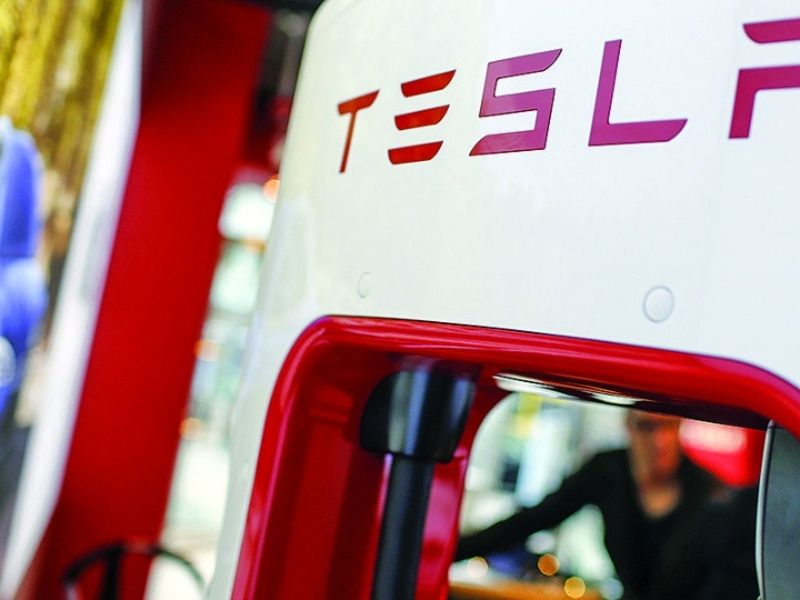
Tesla Inc. on Monday posted first-quarter net income of $438 million amid record global vehicle deliveries and favorable comparisons to 2020, when its operations were temporarily halted by the coronavirus pandemic.
The electric vehicle maker said revenue in the quarter jumped 74 percent to $10.4 billion, with automotive gross margins hitting 26.5 percent. The company was aided by $518 million in sales of regulatory credits to competitors — a 46 percent increase from the same period a year earlier.
Its net income was just $16 million in the first quarter of 2020, when the pandemic shuttered its plants in the U.S. and China.
“Q1 2021 was a record quarter on many levels,” Tesla CEO Elon Musk said on an earnings call. “We’ve seen a real shift in customer perception of electric vehicles, and our demand is the best we’ve ever seen.”
Tesla more than doubled its deliveries to 184,877 from the year-earlier period, and officials said its new plant outside Austin, Texas, remained on track to start production by the end of 2021. The factory will produce the Cybertruck pickup and and Model Y crossover, which Musk on Monday said he believes will “quite likely” be the “best-selling car or truck of any kind in the world” in 2022.
Tesla also builds the Model Y in California and China, and plans to build it in Germany.
The automaker was also helped in the quarter by a $101 million profit following the sale of some Bitcoin. It announced in January the purchase of $1.5 billion in Bitcoin and said it would allow customers to pay for vehicles using the cryptocurrency.
CFO Zach Kirkhorn said Monday that Tesla believed in investing in the cryptocurrency long-term.
The automaker ended the quarter with 561 stores and service centers, 28 percent more than a year earlier.
Tesla said it expects to average 50 percent annual growth in vehicle deliveries moving forward but grow even faster than that this year.
“The rate of growth will depend on our equipment capacity, operational efficiency and capacity and stability of the supply chain,” the automaker said in a statement.
Despite the record deliveries, Tesla’s average selling price fell 13 percent year over year as it changed over to redesigned versions of its higher-priced Model S and Model X, which it said would go on sale “very shortly.” Tesla delivered just 2,030 Model S and Model X vehicles in the quarter compared with 182,847 of the Model 3 and Model Y.
Most of Tesla’s results exceeded Wall Street forecasts, but shares still fell 2.5 percent in after-hours trading to $719.90.
S and X challenges
Despite the record deliveries, Tesla’s average selling price fell 13 percent year over year as it struggled to change over to redesigned versions of its higher-priced Model S and Model X, which it said would go on sale “very shortly.” Tesla delivered just 2,030 Model S and Model X vehicles in the quarter compared with 182,847 of the Model 3 and Model Y.
The automaker originally planned to begin deliveries of the redesigned S and X earlier this year but Musk on Monday noted there were “more challenges than expected” and that it took “quite a bit of development” to ensure the batteries in the vehicles were safe.
He said he expected Model S deliveries to start in May while Model X deliveries would start in the third quarter. He said the company expects to eventually make 2,000 Model S and Model X per week.
Chip shortage
Kirkhorn said the company faced “some minor interruptions in production” in the quarter amid the global semiconductor shortage.
Musk called the chip issue a “huge problem,” although Tesla in an earnings deck noted it navigated the shortage “by pivoting extremely quickly to new microcontrollers, while simultaneously developing firmware for new chips made by new suppliers.”
Jessica Caldwell, executive director of insights at Edmunds, said the automaker appeared to be doing better than its competitors in combating the chip shortage.
“It’s pretty ironic that as an automaker known for producing computers on wheels, Tesla’s deliveries in a quarter marred by a global chip shortage have proven to be so strong,” she said. “2021 was supposed to be a particularly challenging year for the company as it was set to finally face a growing pool of potential ‘Tesla killers,’ but it seems that upcoming vehicle launches will be a bit more tenuous given the constraints on supply…
“Although Tesla might not win the EV marathon, there’s no denying that it’s still jogging far ahead of the competition.”